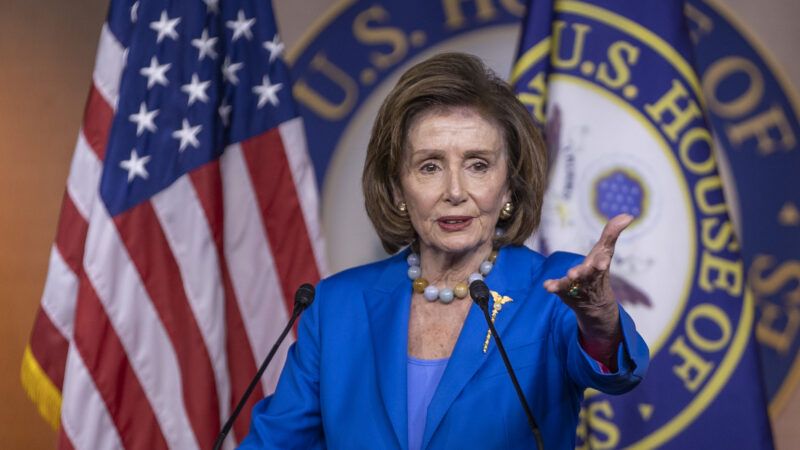Dems Want to Soak the Rich by Snooping on the Poor
Nancy Pelosi, Elizabeth Warren, and co. insist that the IRS needs to know about $600 bank accounts.

House Speaker Nancy Pelosi (D–Calif.) snapped when asked Tuesday if the proposal to dramatically increase the surveillance capabilities of the Internal Revenue Service (IRS) would remain in the trillion-dollar social spending bill currently being negotiated among Democrats on Capitol Hill.
"Yes. Yes. Yes. Yes. Yes," the speaker said. Then she waved aside the questioner's accurate comment that banks have reported customer concerns about the idea that the IRS would scrutinize accounts with inflows and outflows as low as $600.
"With all due respect, the plural of anecdote is not data," Pelosi said, disrespectfully. "Yes, there are concerns that some people have. But if people are breaking the law and not paying their taxes, one way to track them is through the banking measure. I think 600—well, that's a negotiation that will go on as to what the amount is. But yes."
In the face of pushback from worried constituents and mobilized industry groups (commercial banks donated around $20 million to each major party's congressional races in 2020), Democrats have been talking about raising the reporting threshold from $600 to $10,000.
But even that higher level gives the lie to the relentlessly repeated progressive talking point that President Joe Biden's construction of a startlingly invasive financial surveillance state—or "American Families Plan Tax Compliance Agenda," if you prefer—will magically avoid inconveniencing all the lower-income people suddenly eligible to have their cashflow scrutinized by a money-hungry IRS.
Ten grand is about how much you make working full-time in New York City on the minimum wage for four months, for eight months at the federal rate. It's the average annual rent in West Virginia (the least expensive in the country), and less than half the average price paid for used vehicles in 2020. What $10,000—let alone $600—most decidedly is not is the preferred level of annual transactions among the tax-avoidant rich.
Yet that is how this surveillance is being sold on the left.
"Strengthening information reporting, as well as providing protected and sustained I.R.S. funding, would ensure that we focus enforcement on the biggest fish," Sen. Elizabeth Warren (D–Mass.) claimed to The New York Times, presumably with a straight face.
"This is about making sure the top 1 percent can't evade $160 billion per year in taxes," Treasury Department spokeswoman Alexandra LaManna told the Times.
"The Biden tax enforcement plan advances racial equity by addressing the unjust status quo," enthused the Center for American Progress. It would "provide more resources to the IRS to increase enforcement against wealthy tax cheats who evade paying what they owe, a group that's mostly white," according to a joint letter of support from 28 racial equity organizations.
As the estimated 9 million American living abroad can bitterly testify, financial institutions do not care much for having their innards exposed to the IRS, and so will either pass the compliance costs on to the customer or just jettison clients altogether. The 2010 Foreign Account Tax Compliance Act (FATCA), sold as a way to close the "tax gap" by soaking fatcats, instead brought in meager revenue while incentivizing record numbers of Americans to renounce their U.S. citizenship.
The Biden/Pelosi/Warren plan does not as of yet impose such steep self-reporting costs on individual taxpayers. To the extent that there are any details—many are being kicked down the road to future regulators—they have involved requiring banks and other third parties to cough up an annual number for inflows and outflows. But the negotiators have already agreed to Biden's basic setup of giving the IRS an extra $80 billion over the next decade to hire 87,000 new employees and build out a "comprehensive financial account reporting regime" that would intrude into previously untrodden territory (such as Venmo accounts and cryptocurrency), so I'd take the over on regular Joes and Janes seeing a noticeable increase in scrutiny.
Republicans are doing their best to sound the alarm (while the news media are doing their best to stress the "Republicans pounce" angle), but the fact is that without significant outcry about a complicated and hellaciously expensive must-pass monstrosity, some version of this vast new financial surveillance state is likely to get built. Those who value financial privacy are best off seeking it in another country.



Show Comments (154)